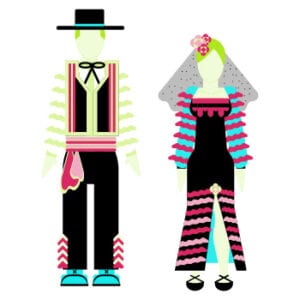
Spanish Words, What’s The Charisma?
Every country and its people are unique. In terms of the ways of life, how they attach meaning to things, what they call them, their mother tongue, the way they describe them, it’s all very special and personal to them. But when it comes to those countries where Romance languages are spoken as official languages, there is one thing very common in all of them. Their native speakers have a very distinctive accent, more than just their vernacular. They tend to have a sense of pride, and accomplishment, perhaps the honor associated with the heirs to the ancient lingua franca. And no one can say that they are wrong. Of course, you wouldn’t question the authenticity of the Spanish language and the people all around the world who speak it.
The Royal Spanish Academy issues dictionaries to make sure the people of all the countries with Spanish as one of their official languages can protect their tongue from a lot of outside influence. As a result, the Costa Rica and Mexican Spanish and the Philippine Spanish can maintain the same vocabularies. The work of the Royal Spanish Academy also helps nonnatives with language acquisition.
The Spanish language may be the official language of Spain but it’s spoken worldwide, in countries of Hispanic America, like Equatorial Guinea and Argentina as well. The language spread because of Spanish colonization of different parts of the world. In some of the places, the residents use a mix of Latin Spanish and Modern Spanish, in others, they are spoken individually. Although it is spoken by millions and is one of the top 5 romance languages, Spanish is not famous only because of these facts. The Hollywood industry and Streaming channels such as Netflix, HBO, and Amazon Prime are also the reason behind the popularity of the Hispanic language. Spanish actors flaunting their irresistible accents, their dialect, their expressions, their character acting, and strong presence got more and more fans. People, even outside the United States, and the Iberian peninsula, fantasize about the idea of speaking like their favorite Spanish actors. and we say, it’s worth a try. If speaking like a don makes you look cool among your friends, then such a language is definitely worth learning.


Language Acquisition; Are Adults Not Capable?
Sure, they are. Interestingly, the passion for learning a new speech establishes more in adult age than in a younger one. Children learn words and actions quickly. But that’s just because they want to be like the people with whom they are surrounded all the time. For instance, a toddler may imitate his older brother’s actions, not only to impress mom and dad but because he wants to be like him. Making sure that you are as good enough as the ones you are trying to imitate is something that makes them feel accomplished.
But here’s the thing with adult language learners, they can grasp new lessons quickly and easily because of the availability of multimedia, apps, and tutorials. Moreover, they can choose which kind of verbose they need to master, for instance, if an Asian gets a job in Hispanic America or in one of those Spanish speaking countries, then he’d need to focus more on official terms. The most common languages that people use in offices daily in Latin America are Spanish and Portuguese. Language acquisition becomes necessary for outsiders who want to work there. Similarly, English language learners can even learn a lot from English movies and series.
For someone, who is an aspiring student, he would love to speak like native Spanish speaking students, would love to learn some slang, a few tough words, just to blend in, to look cool. So, keeping that in view, adult learners become more capable of learning a new language. But they cannot just rely on the dictionary of the Royal Spanish Academy to get them through Spanish classes. Their memorization, word recognition, and picking power may not be as strong as that of a young child to learn a target language but their good sense to make a distinction between what kind of content is useful for them and which is not, will help them.
Can You Learn the Spanish Language By Native Speakers Only?
If you are aiming to speak like one, then yes, absolutely. Spanish language learning and language processing are tough nuts to crack but if you are an English speaker, it can become easier for you to ace your Spanish classes. There might be an editor’s choice language learning app but nothing can beat the traditional old school learning system with a Spanish teacher instilling knowledge into the curious minds of young learners. Living in the United States, you must have already come across many Spanish speakers and in Latin American countries, the ratio of native Spanish speakers is even higher for Latin Spanish. Language acquisition from someone who is qualified enough is crucial in language development. Late learners should take note.
The reason why linguists emphasize learning an official language from a native is their grip on the local usage, understanding of using culturally appropriate terms in a conversation, modern Spanish and slang, the rough and thick accent, the Spanish dialect and idioms. The edge that they have over other interpreters is their nativity. However, some of the specialists might disagree with the statement that only native Spanish teachers could be good enough tutors of a native language. In their opinion, if someone took a language course from a recognized university and did all the necessary academic research while working on their thesis, they are even more qualified than any other professional native. They are of the view that all romance languages are a critical part of linguistic history and they can be learned by anyone who is thorough enough. In the old age, local languages were preserved and passed on through literary work too.


Spanish Speakers Across The Globe!
Did you know that according to the Spanish government’s Cervantes Institute (Instituto Cervantes), over 572 million people spoke Spanish all around the world of which 477 million are natives? Were you aware that it is the world’s second most spoken native language of the world? Did you ever read that Philippine Spanish came into existence in the colonial period and is still spoken there? Well, yeah the Romance languages have kept the romance alive in most Spanish-speaking countries.
According to Babbel.com, Spanish is the official language of 20 Spanish-speaking countries including Chile, Bolivia, Argentina, Colombia, Puerto Rico, Costa Rica, Mexico, Equatorial Guinea, and Spain. Instituto Cervantes even updates their annual reports on different statistics including the number of people who speak Spanish worldwide. All these countries have different Spanish dialects. In the colonial period, Spanish was spoken in the Philippines as it was a former territory of Spain at that time. The Philippine Spanish is still spoken by millions in the Philippines, the largest Spanish Speaking Asian country, not only that, about a third of the Philippine language is derived from Spanish words which account up to more than 4000 loan words. Who would have known Filipinos got so much from Spanish, let alone, a Spanish of their own, known as Philippine Spanish. The Royal Spanish Academy helps with the preservation of the language. They don’t want it to become Spanish English, where the words of the latter end up taking over the former.
The Spanish spoken in Latin American countries is known as Latin Spanish. In Latin Spanish, Spanish is called Espanol. Spanish originated from Vulgar Latin which was brought to the Iberian Peninsula by the Romans. Around 75% of Modern Spanish comes from Latin and there are many Latin initials in Spanish. Most Spanish speakers are in Hispanic America. Spanish is also the second official language of Western Sahara, spoken with an Arabic dialect, along with Arabic itself. Seems like a whole lot of Spanish people are scattered in the world.
What Annoys Native Spanish Speakers?
If we are talking about Spanish and native speakers, we certainly can’t avoid the subjects that annoy them. According to native Spanish speaking students, it really bothers them when people try to use Modern Spanish greetings and expressions excessively and unnecessarily. For instance, using words like Hola, amigos, adios, per favor, etc. just to sound like them seems harsh to them. It rather feels like mockery to them.
And in many instances, people use them without knowing the verb forms, gender association with them. This is more offensive to native speakers. Many Spanish students who are English language learners face this situation on daily basis. They also state that due to the difference in phonetics, English speakers use t. and tu in a way that is not right. Some of the students even say that people need to understand that language acquisition is not something you can gain by watching some series or listening to some songs. A language is a complete horizon, a subject which is learned throughout life and you can still come across a new discovery.
Romance languages have their own distinctive tone, yet we must all understand that we can’t sound like them and neither should we try, unless, of course, language acquisition is our goal and it must be met through proper channels.


